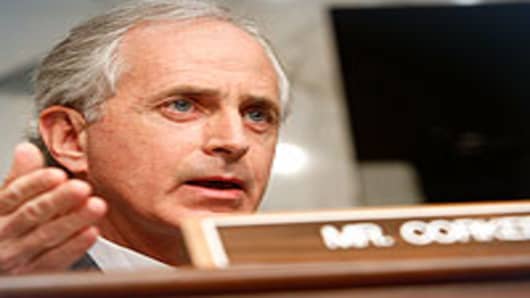A key member of the House-Senate conference committee working on a compromise version of sweeping financial reform legislation said he hopes to improve the bill but is unlikely to vote for it.
"I want to make the bill better, even if I can't support it," said Sen. Bob Corker (R-Tenn.), a banking committee member who spent many hours negotiating with Democratic committee chairman Chris Dodd of Connecticut before the bill went to the Senate floor.
In an interview with CNBC, Corker singled out new consumer protections for financial products and resolution authority to deal with too-big-to-fail firms that might be threatening the overall economy as two areas that needed important changes.
"I'm very concerned about consumer protection," Corker told "Squawk Box. "There's almost no way to overcome the rules."
Corker and most other Republicans voted against the bill in the Senate.
Congress' "base bill' version of the the Senate-House compromise, "Restoring American Financial Stability Act of 2010’’, was released Thursday.
The conference kicked off with opening statements from the 78 members. The conference is chaired by House Financial Services Chairman Barney Frank (D-Mass.), but Senate Banking Chairman Chris Dodd (D-Conn.) is also expected to play a key role, as he is the principal author of the Senate bill.
The bill, which has 12 sections. covers all the major components of the individual Senate and House bills. (See a rundown of key differences here.)
Earlier Friday, a key financial industry representative told CNBC that it welcomed the reform package but said tough measures to regulate the over-the-counter derivatives market were among those that went too far.
"We think about 80 percent of it is good," said Steve Bartlett, president of the Financial Services Roundtable, which represents more than a 100 big firms. "The other 20 percent are elements that will scare you to death."
Conferees will take up the first components next Tuesday, though not in the order they appear in the bill. The highly controversial area of derivatives is likely to be last, according to one Congressional source familiar with he conversations.
- Read The Bill Here
Discussion, or consideration, will run through Thursday, Staff will continue to work on the bill in their absence. Conferees will return Tuesday, June 22 and work every day until the bill is done, according to a senior Congressional staffer.
The goal is to have a bill approved by both chambers of Congress and signed into law by President Obama by the Independence Day holiday weekend.
The final list of conference members was released late Wednesday.
Slideshow: Richest Members of CongressComplete Economics & Government Coverage



